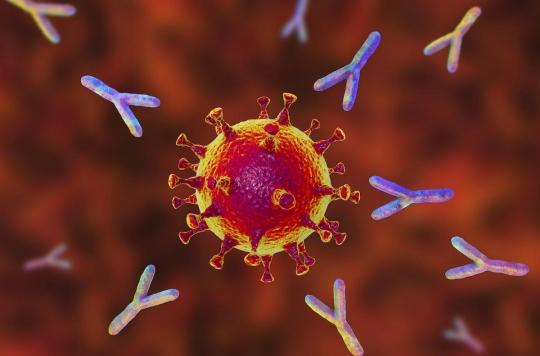The disparity in the reactions of infected patients who contract Covid-19 could be explained, in part, by genetic and immunological abnormalities.

- Between 15 and 20% of severe forms are caused by autoantibodies in the blood of patients that target IFN 1, a protein produced in response to a viral infection.
- About 1.3% of male patients have a genetic defect in the TLR7 gene that also inhibits IFN1.
Faced with Covid-19, patients are not equal. Some are asymptomatic while others develop severe forms that lead to hospitalizations. Two new studies, published this Thursday, August 19 in the journal Science Immunology, claim that a quarter of the severe forms of the virus are explained by a genetic or immunological anomaly. These two new studies were conducted by international researchers and piloted by Inserm researchers and teacher-researchers from the University of Paris and doctors from the AP-HP in the human genetics of infectious diseases laboratory.
A genetic abnormality of the TLR7 gene in some male patients
In the first study, scientists have sought to understand why men are more affected by severe forms than women. They started by sequencing the X chromosome of 1,202 patients who developed a severe form of Covid-19. Among them, they found that 16 possess so-called “loss of function” genetic variants at the level of the TLR7 gene which led to the development of critical forms. “This gene plays a major role in the mechanism of IFN 1 production”, a protein produced in response to a viral infection and which has the effect “inhibit virus replication in infected cells”, advances the AP-HP in a communicated.
The result is that “the 16 patients thus presented an IFN 1 deficiency preventing their cells from fighting against the Sars-Cov-2 infection, thus explaining the severe forms”, underlines the AP-HP. For this research, and in order to obtain a representative sample and avoid any ethnic bias, “the researchers recruited patients all over the world, mobilizing 400 research centers in 38 different countriesassures the AP-HP. So that the results of this cohort can be transposed to the general population. It shows that 1.3% of severe forms of Covid-19 are explained by genetic abnormalities of the TLR7 gene in men. This deficit is more frequent (1.8%) in patients under 60 years old..”
15 to 20% of severe forms caused by autoantibodies in patients’ blood
During the second study, the researchers have shown that 15 to 20% of severe forms are due to the presence of auto-antibodies in the patient’s blood. The latter specifically target IFN 1s.”It has been demonstrated that these antibodies block the protective effect of IFN 1 on viral replication. The Sars-Cov-2 virus thus penetrates cells without encountering resistance and replicates in an uncontrolled manner.”, adds the press release. For this research, the scientists examined 3,595 critically ill, 1,639 asymptomatic and 34,159 healthy people from 38 different countries.
In addition, this study found that autoantibodies against IFN 1 increase with age, which may explain why more elderly people are affected by severe forms. They appear very rare before the age of 65 (0.2 to 0.5%) and then increase exponentially with age, reaching 4% between 70 and 79 years old and 7% between 80 and 85 years old.


















